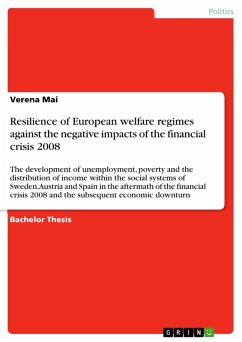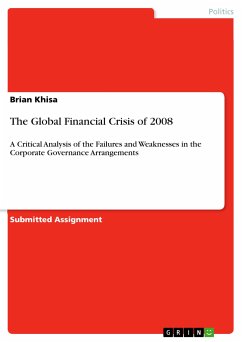
Resilience of European welfare regimes against the negative impacts of the financial crisis 2008 (eBook, PDF)
The development of unemployment, poverty and the distribution of income within the social systems of Sweden, Austria and Spain in the aftermath of the financial crisis 2008 and the subsequent economic downturn
Versandkostenfrei!
Sofort per Download lieferbar
34,99 €
inkl. MwSt.
Weitere Ausgaben:

PAYBACK Punkte
0 °P sammeln!
Bachelor Thesis from the year 2012 in the subject Politics - Region: Western Europe, grade: 1,0, Vienna University of Economics and Business (Institut für Sozialpolitik), language: English, abstract: The financial crisis, which struck the EU countries in 2008, was followed by the severest economic recession since the end of the Second World War, involving a significant drop in GDP (negative economic growth) for most of them. Output growth has turned negative or stagnated in several countries, the impact on labour markets has led to rising unemployment rates and public debt and deficits have s...
Bachelor Thesis from the year 2012 in the subject Politics - Region: Western Europe, grade: 1,0, Vienna University of Economics and Business (Institut für Sozialpolitik), language: English, abstract: The financial crisis, which struck the EU countries in 2008, was followed by the severest economic recession since the end of the Second World War, involving a significant drop in GDP (negative economic growth) for most of them. Output growth has turned negative or stagnated in several countries, the impact on labour markets has led to rising unemployment rates and public debt and deficits have soared. In the aftermath of the crisis countries were confronted with a deteriorating social context, which is due to the severity of the economic downturn, the worsening job situation and the increased unemployment. This has resulted in a heightened need for social protection while at the same time making it more difficult to finance. The crisis has highlighted the role of social protection as a social buffer and an economic stabilizer that cushions the impact of recessions. Social benefits have been an essential element of national crisis response in the countries of the European Union. Social security programmes not only act as an important component of the crisis "exit strategy", helping to revitalize the economy but they also protect the most vulnerable part of society. One of the lessons that can be learned from the crisis is that countries and their inhabitants are differently exposed to economic shocks due to the variations in the design of social security that they are covered with. This consideration is essential to analysis because, as Ozdemir et al (2010) point out, the origins of the crisis can be spotted in the financial sector, where income levels tend to be relatively high. Nevertheless, there is piecemeal evidence that the most vulnerable in society have to struggle most with the negative consequences of the crisis. This work examines the capacity of specific types of welfare states, classified mainly according to Esping-Andersen's concept, to absorb macro-economic shocks - in particular with reference to the most vulnerable parts of society. Which social policy challenges arise in Sweden, Austria and Spain and which differences in the economic and socio-political impacts of the crisis can be identified? The question regarding the ability of a system to handle external disturbances gains importance, as one of the main claims after the outbreak of the financial crisis is to improve our political, economical and societal systems to become more resistant or resilient.
Dieser Download kann aus rechtlichen Gründen nur mit Rechnungsadresse in A, B, BG, CY, CZ, D, DK, EW, E, FIN, F, GR, HR, H, IRL, I, LT, L, LR, M, NL, PL, P, R, S, SLO, SK ausgeliefert werden.













